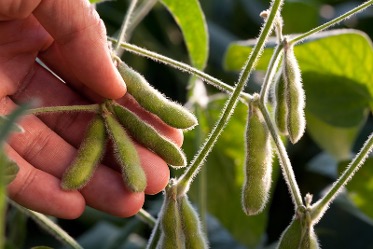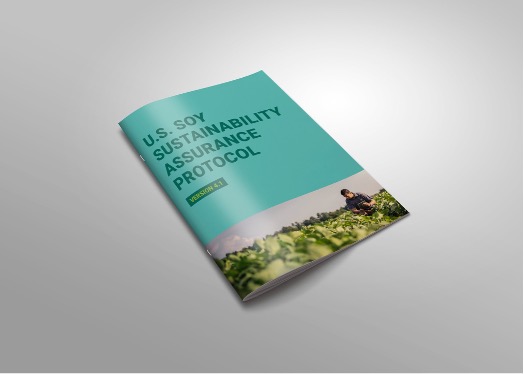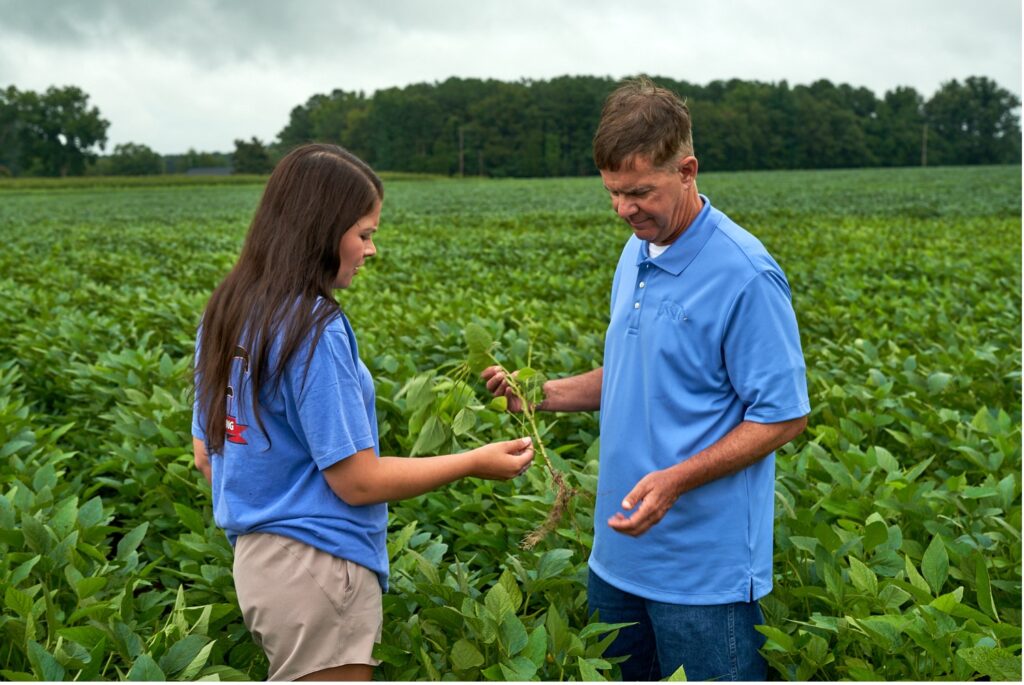
U.S. Soy Sustainability Assurance Protocol (SSAP)
Independently Verified Sustainable U.S. Soy
The sustainability of U.S. Soy is verified by the U.S. Soy Sustainability Assurance Protocol (SSAP), providing customers a trusted, credible way to demonstrate their commitment to sustainable sourcing. Backed by data, third-party verification and dedicated U.S. soybean farmers, the SSAP helps businesses reach their Environmental, Social and Governance (ESG) goals and share their story with confidence.

Measurable Business Impact
Companies that choose SSAP-verified soy often see direct benefits.
“Getting the SSAP certificate is a concrete demonstration of our commitment to ESG. It strengthens consumer trust and helps us align with global environmental standards. We look forward to expanding our sustainability efforts through broader collaboration across the supply chain.”
–Zeng Min, Executive Director of Dekon Group
From efficient resource use to optimized energy strategies, the SSAP supports every step of the supply chain and helps businesses showcase their sustainability credentials to customers, regulators, and investors. Choosing sustainable U.S. Soy is much more than a supply chain decision. It’s a powerful statement of your company’s values and a key indicator of your brand reputation – which makes it a smart business strategy. SSAP-verified, sustainable U.S. Soy helps your business achieve its sustainability metrics and streamline ESG reporting.
What is the U.S. Soy Sustainability Assurance Protocol?
The SSAP is a national protocol that describes the regulations, processes and management practices that ensure sustainable soy production in the United States. It is one part of the overall U.S. Soy producer sustainability program, which includes processes and practices that contribute to the improvement of environmental, social and economic sustainability outcomes over time. Developed through a robust, multi-stakeholder process, the SSAP is more than a checklist. It’s a comprehensive, transparent system grounded in science and continuous improvement.

Verified Sustainable Farming Practices
Every year, more than 20,000 independent audits are conducted by the United States Department of Agriculture (USDA) Natural Resources Conservation Service (NRCS) to verify compliance with SSAP standards. These audits – combined with self-assessments and ongoing documentation – ensure that U.S. Soy farmers are consistently implementing responsible, sustainable practices.
The four key directives of the SSAP are:
- Biodiversity and High Carbon Stock
Safeguard environmental biodiversity by not growing soybeans in wetlands, grasslands, forests or other protected areas. - Production Practices
Focus on production methods to enhance the environment and conserve natural resources while boosting efficiency and output.
- Public and Labor Health and Welfare
Ensure the protection of public and worker rights and promote fair labor standards, equal employment opportunities and compliance with the Clean Water Act.
- Continuous Improvement
Achieve greater efficiency and environmental stewardship each year, continuously enhancing sustainable farming practices.

Ambitious Goals for a Healthier Planet
U.S. soybean farmers are not only meeting today’s standards, they’re working hard to continuously improve their farming practices. With clear 2030 sustainability goals1 in place, their focus is on measurable impact:
- Reduce land use impact by 10%
- Reduce soil erosion by 25%
- Reduce energy use by 10%
- Reduce greenhouse gas emissions by 5%
These sustainable farming initiatives reflect the leadership of U.S. soybean farmers in being stewards of the environment while supporting the nutrition security of a growing global population.


Recognized and Trusted Worldwide
The SSAP is trusted around the world and has received multiple third-party accreditations, including:
- FEFAC – The European Feed Manufacturers’ Federation
- GLOBALG.A.P. – Good Agricultural Practices
- SAI Platform’s Farm Sustainability Assessment (Gold Level)
- Global Seafood Alliance Best Aquaculture Practices
- GMP+ International Feed Verification Scheme
- QS Quality Scheme for Food
These certifications give businesses around the globe the assurance that sourcing sustainable U.S. Soy verified by the SSAP meets the highest environmental, social and production standards.
Supporting the United Nations Sustainable Development Goals
U.S. Soy and the SSAP also align with the UN’s Sustainable Development Goals (SDGs), particularly Goal 2: Zero Hunger. Soy is a critical protein source in global diets, and the SSAP helps ensure it’s produced responsibly. The SSAP supports SDG targets through:
- Improved soil health and carbon sequestration
- Responsible water management
- Reduced greenhouse gas emissions
Additionally, sustainable U.S. Soy’s strong labor practices, fair business ethics and zero deforestation footprint align with broader SDG themes around equity, justice and environmental protection.

Flexible, Transparent, and Transferable
The SSAP includes the option to use transferable SSAP certificates. These certificates can move through the value chain, allowing up to four transfers beyond the point of export. This added flexibility improves transparency, streamlines record-keeping and helps every link in the supply chain demonstrate sustainability.
To date, more than 180 international customers have already received transferable certificates, reinforcing their commitment to verified sustainable sourcing.
1. These goals were adopted by key U.S. Soy organizations in December 2024 and are based on Field to Market 2020 benchmark.

